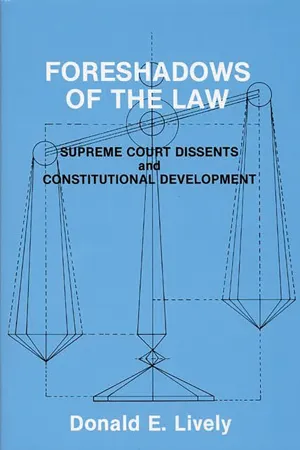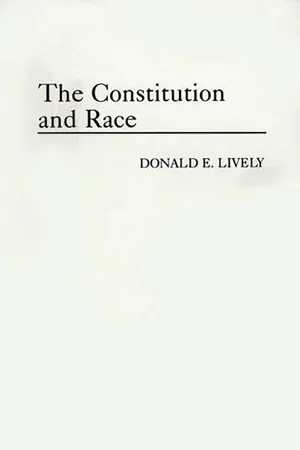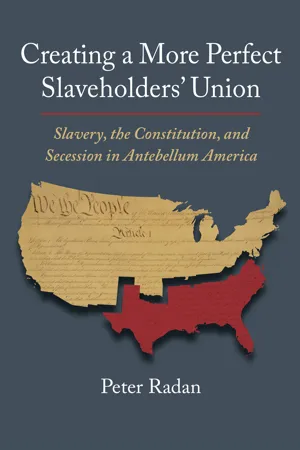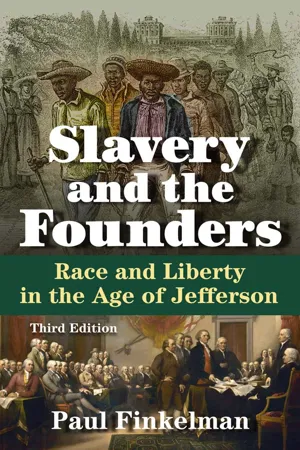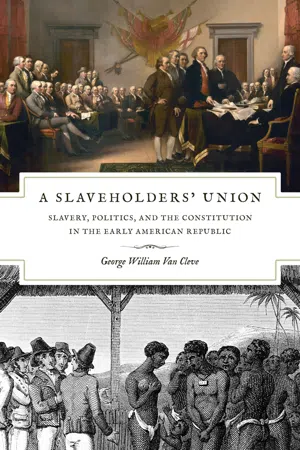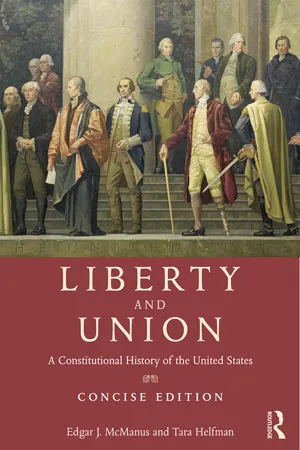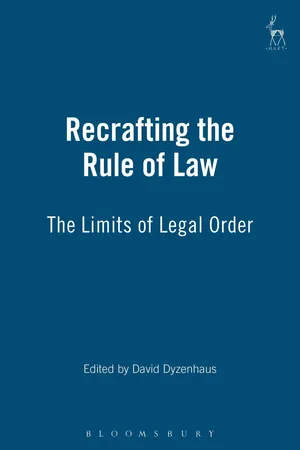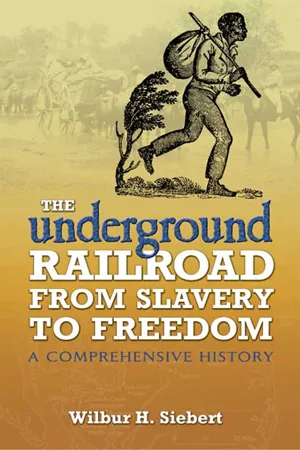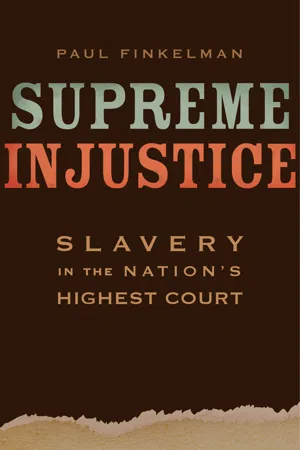Politics & International Relations
Fugitive Slave Clause
The Fugitive Slave Clause was a provision in the United States Constitution that required escaped slaves to be returned to their owners, even if they had reached free states. This clause was a source of tension between Northern and Southern states and contributed to the growing divide over slavery in the years leading up to the Civil War.
Written by Perlego with AI-assistance
Related key terms
1 of 5
9 Key excerpts on "Fugitive Slave Clause"
- eBook - PDF
Foreshadows of the Law
Supreme Court Dissents and Constitutional Development
- Bloomsbury Publishing(Author)
- 1992(Publication Date)
- Praeger(Publisher)
Rivaling controversies over territory and statehood as a source of mutual antagonism was the fugitive slave controversy. 8 Foreshadows of the Law Fugitive Slave Controversy The dispute over the status of fugitive slaves probably had more sym- bolic than practical significance. From an economic standpoint, a runaway slave even if recaptured had diminished market value attributable to dem- onstrated unreliability. The willingness of Northern states to facilitate the return of runaway slaves was a significant indicator to the South of sincer- ity and cooperative spirit in accommodating slavery. For North and South alike, the fugitive slave controversy became graphic evidence of systemic incompatibility. Runaway slave problems drew the attention of the Constitutional Con- vention, which drafted the fugitive clause, and Congress, which passed the Fugitive Slave Act of 1793. The enactment actually was prompted less by specific runaway slave problems than by a dispute among states over gen- eral criminal extradition. The law affirmed the duty of one state to return a fugitive from justice to another and established the right of a slave owner to recapture a runaway slave. Although the measure was based on the Fugitive Slave Clause, the linkage was at least questionable. The Constitu- tion provides that: No Person held to Service or Labour in one State, under the laws thereof, escap- ing into another, shall, in Consequence of any Law or Regulation therein, be dis- charged from such Service or Labour, but shall be delivered up on Claim of the Party to whom such Service or Labour may be due. Although identifying a duty of returning runaway slaves, the Fugitive Slave Clause assigned to Congress no power to enforce it by legislation. Because the clause is housed in Article IV, Section 2, which concerns interstate relations, rather than in Article I, which enumerates the powers of the national legislature, congressional implementation of it was at least a de- batable proposition. - eBook - PDF
- Donald E. Lively(Author)
- 1992(Publication Date)
- Praeger(Publisher)
12 Although the clause eventually elicited intense constitutional contro- versy, its original purpose is uncertain. The provision was drafted and adopted without debate or formal vote as the convention was winding down. Not surprisingly, given its vagueness and relative inattention af- forded it, the Fugitive Slave Clause was a source of diverging interpre- tations ranging from the sense that it established a right of recovery anywhere in the nation to the perception that it simply precluded another state's emancipation of runaway slaves. 13 The observation has been made that, during the framing process, no one "could foresee a federally regulated Fugitive Slave Law with marshals and special commission- ers." 14 Soon after ratification, however, Congress enacted legislation that enshrined the clause as a predicate for affirmative federal support of slavery. Congress initially accounted for the fugitive slave problem by passing 16 THE CONSTITUTION AND RACE the Fugitive Slave Act of 1793. The act (1) imposed on a state the duty to return fugitives upon official demand, and (2) enabled a slave owner to cross state lines, apprehend the alleged fugitive, and, upon proof of ownership to a judicial officer, reclaim and remove the person. 15 Al- though the act itself provided no incidents of due process, such as the right to a hearing, several states enacted laws prohibiting the kidnapping of blacks or at least providing opportunities to contest the claims of slave owners or their agents. 16 Fugitive slave legislation represented an early paradox in the federal system. Slavery had been constitutionally accommodated pursuant to the premise of federal neutrality and individual state determination. Im- position of universal obligations to account for fugitive slaves constituted an early exercise in the expansion of federal power. The constitutional predicate for the policy, as previously noted, was dubious but originally uncontroverted. - eBook - ePub
Creating a More Perfect Slaveholders' Union
Slavery, the Constitution, and Secession in Antebellum America
- Peter Radan(Author)
- 2024(Publication Date)
- University Press of Kansas(Publisher)
What the extant records reveal is that this wording of the Fugitive Slave Clause was put to the Convention when the final form of the Constitution was presented and voted upon on 15 September 1787. What the records also show is that on that day, “[o]n the question to agree to the Constitution, as amended,” all the States present voted “ay.” 298 One of the said amendments was to an earlier version of the Fugitive Slave Clause that had been unanimously approved by the eleven States present at the Convention on 29 August 1787. 299 Article IV, Section 2, Clause 3 was the result of stylistic amendments to that clause made by the five-member Committee of Style and Arrangement. The purpose of the Fugitive Slave Clause was, as stated by Edmund Randolph at Virginia’s ratification convention, to give authority “to owners of slaves to vindicate their property,” 300 because, in the words of Bruce Ragsdale, for slaveholders, such as George Washington, “the most serious betrayal of the presumed duty of an enslaved laborer was the act of running away.” 301 Washington had made this clear when, six months prior to the Philadelphia Convention, in relation to a prospective purchase of six healthy male slaves, he wrote that he wanted to be sure that “none of them [are] addicted to running away.” Of slave flight he said, for emphasis: “I abominate [it].” 302 Initially it can be noted that the Fugitive Slave Clause is distinguished in its wording from the clause immediately preceding it (Article IV, Section 2, Clause 2), which related to the extradition of persons “flee[ing] from Justice” in relation to charges of treason, felony, or other crimes. As George Anastaplo suggests, the implication to be drawn from this is that runaway slaves were not regarded as fugitives fleeing “from Justice.” 303 Rather, the Fugitive Slave Clause was, as Chief Justice Taney wrote in Dred Scott v - eBook - ePub
Slavery and the Founders
Race and Liberty in the Age of Jefferson
- Paul Finkelman(Author)
- 2014(Publication Date)
- Routledge(Publisher)
During the first decade under the Constitution, Congress dealt with issues of the slave trade, the problem of slavery in the territories, and the admission of new slave states. Most important, in 1793 Congress passed the first Fugitive Slave Law, which aided southerners hunting after their runaway human chattel. This law was a major boon to the South with no reciprocal gain for the North. In addition to the substance of the law, the adoption of the law was an important constitutional change.The Fugitive Slave Clause of the Constitution provided: “No person held to Service or Labour in one State, under the Laws thereof, escaping into another, shall, in Consequence of any Law or Regulation therein, be discharged from such Service or Labour, but shall be delivered up on Claim of the Party to whom such Service or Labour may be due.”2 Arguably, this clause did not give Congress the power to pass any statute to enforce the provision, but merely admonished the states to act in a certain way. By interpreting the clause in the way it did, Congress made the Constitution even more proslavery than it perhaps was.Late in the Constitutional Convention of 1787 Pierce Butler and Charles Pinckney, both of South Carolina, proposed that a Fugitive Slave Clause be added to the provision requiring the interstate extradition of fugitives from justice. James Wilson of Pennsylvania objected to the juxtaposition because “this would oblige the Executive of the State to do it, at the public expence.” Butler discreetly “withdrew his proposition in order that some particular provision might be made apart from this article.” A day later, the Convention, without debate or formal vote, adopted the fugitive slave provision.3 Eventually the two clauses emerged as succeeding paragraphs in Article IV, Section 2 of the Constitution.The paucity of debate over the Fugitive Slave Clause is remarkable because by the end of August 1787, when the Convention adopted the clause, slavery had emerged as one of the major stumbling blocks to a stronger union. While it was morally offensive to a number of northern delegates, some southerners defended slavery with an analysis that anticipated the “positive good” argu-ments of the antebellum period. Nevertheless, unlike the debates over the slave trade, the three-fifths clause, the taxation of exports, and the regulation of commerce, the proposal for a Fugitive Slave Clause generated no serious opposition. The delegates to the Constitutional Convention may have been simply too exhausted for further strenuous debate. It is more likely, however, that the northern delegates failed to appreciate the legal problems and moral dilemmas that the rendition of fugitive slaves would pose. In 1787 even those northern states that were in the process of gradual abolition, such as Pennsylvania, recognized the need to return runaway slaves to their owners.4 - eBook - PDF
A Slaveholders' Union
Slavery, Politics, and the Constitution in the Early American Republic
- George William Van Cleve(Author)
- 2010(Publication Date)
- University of Chicago Press(Publisher)
That silence was later relied on to claim that the Convention intended to deny c h a p t e r f o u r 172 Congress power to implement the clause. But during the adoption of the Fugitive Slave Act of 1793, no one contended that Congress lacked power to adopt it, although attacks on congressional power to legislate on par-ticular subjects under the Constitution were common at the time. 113 In the early Republic, congressional power to implement the clause seems to have been widely accepted, and served the common interest of the states in controlling fugitives without chronic interstate disputes. From the slave state Federalist perspective, the Fugitive Slave Clause was a substantial gain. Slave state insistence from 1785 onward on including a Fugitive Slave Clause in the Northwest Ordinance suggests that given their prior experience with disruption from fugitive slavery and the progress by 1787 of Northern state abolition, the slave states would have been reluc-tant, perhaps even unwilling, to agree to the Constitution without obtain-ing what they deemed adequate federal legal protection against fugitive slave flight. Inclusion of the clause meant that the slave states could avoid the future creation of any significant northern free jurisdiction “magnets” for fugitive slaves, just as they had insisted that that problem be avoided for the Northwest Territory. At the same time, the clause added legitimacy to their control of slave property by establishing direct constitutional legal protection for it. 114 Fortunately, at the time Northern states undergoing abolition also had an interest in controlling fugitives. As chapter 2 shows, for them the clause served several purposes: it prevented an influx of run-away slaves whose presence white taxpayer majorities often either objected to on racist grounds or believed would result in unwanted social costs such as increased poor-relief taxes and discouragement of white immigration. - eBook - ePub
Liberty and Union
A Constitutional History of the United States, concise edition
- Edgar J. McManus, Tara Helfman, Edgar McManus(Authors)
- 2014(Publication Date)
- Routledge(Publisher)
Because McLean had politicized the case by referring to slavery as an evil, the other justices felt compelled to speak out on the issue. To say nothing might be taken for tacit agreement. Although Taney agreed with McLean that the states could exclude slaves, he carefully avoided giving offense to the South. “The power over this subject,” he said, “is exclusively with the several states; and each of them has the right to decide for itself whether it will or will not allow persons of this description to be brought within its borders from another State, either for sale or for any other purpose.” Justice Baldwin sharply disagreed. He contended that slaves were property and that Congress had a duty under the Fifth Amendment to protect all property “from any state law which affects to prohibit its transmission for sale from one State to another.” It therefore logically followed that the amendment also prevented Congress from interfering in the interstate shipment of slaves. Justices Story and McKinley further complicated matters with dissenting opinions that the Mississippi prohibition was not only constitutional but barred the creditors from enforcing the notes.Fugitive Slaves and Due Process of Law
No aspect of the slavery issue was more controversial than the capture and return of runaway slaves. Article IV of the Constitution provided that persons who fled from bondage across state lines “shall be delivered up on Claim of the Party to whom such Service or Labour may be due.” In 1793 Congress gave effect to this provision by passing a fugitive slave law establishing federal procedures for the return of runaways. The law caused no controversy at the time because slavery had not yet emerged as a serious sectional issue. But by the 1820s both slavery and the law came under attack in the North. Northerners complained that the federal procedures for the return of runaways did not adequately protect free blacks in the North against unjust enslavement. The process was stacked outrageously against alleged runaways in fugitive slave proceedings. Federal judges had authority to issue certificates of return on the oath of the owner or his agent that the person claimed was a fugitive. The mere word of the claimant was enough to consign any African American to bondage.The shortcomings of the federal process led northern states to pass so-called personal liberty laws. These laws made it a crime for claimants to remove alleged runaways without first obtaining an order of removal from a state court. The state court proceedings for obtaining the order were as heavily stacked against slaveholders as the federal proceedings were stacked in their favor. Some state judges refused to issue orders of removal regardless of the evidence. New York gave alleged runaways the right to a jury trial, and juries almost always brought in verdicts against the claimant. Despite their rights under federal law, slaveholders found it virtually impossible to recover their runaways through state court proceedings. But failure to comply with the state procedures could result in heavy fines and prison terms. - eBook - PDF
Recrafting the Rule of Law
The Limits of Legal Order
- David Dyzenhaus(Author)
- 1999(Publication Date)
- Hart Publishing(Publisher)
Within the logic of Somerset , entry into a Northern state did not “free” the slave; nonetheless a Southern state could modify its own law to treat voluntary transport to a Northern state as the equivalent of manumis-sion. See Aves , n. 23 above, at 369 (discussing Ex parte Grace , 2 Hagg. Adm. (G.B.) 94 (1827)) (ques-tion of what would should happen if Somerset were to return voluntarily to Louisiana “is a question incidentally raised in the argument, but is one on which we are not called on to give an answer” and Collins v America, a woman of color , 9 B. Mon. (Ky.) 565, 571 (1849) (whether to treat black who had lived in free state as free was a matter of Kentucky law)). It is worth noting that in the beginning, Southern states recognised the “liberating” effects of a visit to a Northern state for non-fugitive slaves: see Finkelman, An Imperfect Union , n. 3 above, at p. 189 (“in many ways the South was more liberal toward freedom claims than the North” until the mid-1830s). Whether they would have done this but for the guarantee of the return of fugitive slaves is an open question upon which we can only speculate. Secondly, a treaty between a Northern and a Southern state ensuring the recapture of But, of course, the United States was created, and there was no need for treaties between the states with regard to slavery. Instead, there was the Fugitive Slave Clause in the Constitution. Shaw argued that the Fugitive Slave Clause secured the same ends that his hypothetical treaties would have secured, but with one important difference: the “right” to reclaim a slave was not granted to the citizens of a Southern state “by” a Northern state, it was guaranteed by the federal Constitution. Although Shaw used the conceit of a hypothetical treaty between the states to interpret the meaning of the Fugitive Slave Clause, he never lost sight of the fact that, as a matter of structure, whatever right a slave-holder had was ultimately a federal right. - eBook - ePub
The Underground Railroad from Slavery to Freedom
A Comprehensive History
- Wilbur H. Siebert(Author)
- 2012(Publication Date)
- Dover Publications(Publisher)
In August of the following year the national convention of the new party, comprising nearly a thousand delegates from all the free states except New Hampshire, made the disavowal of the fugitive recovery clause of the Constitution a part of the party platform, voting by a decisive majority “to regard and treat the third clause of the Constitution, whenever applied to the case of a fugitive slave, as utterly null and void; and consequently as forming no part of the Constitution of the United States whenever we are called upon or sworn to support it.” 906 About the time of the announcement of this principle, Mr. Garrison issued in behalf of the American Anti-Slavery Society an address to the bondmen of the South, in which they were promised deliverance from their chains, and were encouraged to run away from their masters. “If you come to us, and are hungry,” ran the address, “we will feed you; if thirsty, we will give you drink; if naked, we will clothe you; if sick, we will minister to your necessities; if in prison, we will visit you; if you need a hiding-place from the face of the pursuer, we will provide one that even bloodhounds will not scent out.” 907 Such open attacks upon the property rights of planters and slave-traders must have been extremely aggravating to Southerners, and, of course, contributed to bring the question of a more effective Fugitive Slave Law again under the consideration of Congress, notwithstanding the fact that a large share of that body’s attention was occupied during the period from 1844 to 1848 with matters connected with the annexation of Texas, the Mexican War and the settlement of the Oregon boundary dispute. In 1847 the legislature of Kentucky presented a petition to Congress urging the importance of new laws so framed as to enable the citizens of slaveholding states to reclaim their negroes when they had absconded into the free states. This resulted in a bill reported in the Senate, but the bill never got beyond its second reading - eBook - PDF
Supreme Injustice
Slavery in the Nation’s Highest Court
- Paul Finkelman(Author)
- 2018(Publication Date)
- Harvard University Press(Publisher)
Significantly, both sources were available to him in 1842 when he wrote Prigg. The history he invented supported his goal of nationalizing the law. By reshaping the clause into a fundamental part of the bargain over the Constitution, he could argue for exclusive federal ju-risdiction over the return of fugitive slaves. In the 1830s, southerners felt slavery was under attack. In his Commentaries on the Constitution of the United States, published in 1833, Story tried to assuage the South by de- JOSEPH STORY 151 scribing the clause as a gift from the North to the South; then, in Prigg, Story elevated the clause to a central part of the constitutional bargain. In the Commentaries, Story claimed that the lack of a fu-gitive slave provision in the Articles of Confederation “was felt as a grievous inconvenience by the slave-holding states, since in many states no aid whatsoever would be allowed to the masters; and sometimes indeed they met with open resis-tance.” 59 In 1787, however, no state prevented masters from recovering runaways. Pennsylvania, Connecticut, and Rhode Island specifically recognized the right to recover a fugitive slave even while they were dismantling slavery themselves. New York and New Jersey were still slave states. In his Com-mentaries, Story ignored this history because it suited his nationalistic purpose to elevate the clause to an important gift from the North “for the benefit of the slaveholding states,” indicating northern goodwill toward the “peculiar interests of the south.” Story used the example of the clause “to repress the delusive and mischievous notion that the south has not at all times had its full share of benefits from the Union.” 60 In Prigg, Story shifted the argument, asserting that the Constitution obligated the U.S.
Index pages curate the most relevant extracts from our library of academic textbooks. They’ve been created using an in-house natural language model (NLM), each adding context and meaning to key research topics.
